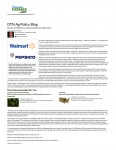Potato is best tolerated food, says tester
according to a study by YorkTest which has dubbed the humble
spud, the 'safest food in Britain'.
Food intolerance has become a major theme for manufacturers, who are increasingly catering to niche market consumers who follow a lactose-, gluten- or wheat-free diet, for instance. Sufferers of food intolerance report symptoms such as irritable bowel syndrome, migraines, eczema and fatigue. According to Euromonitor International, the UK is the third-biggest market for gluten-free foods (after the US and Italy), amounting to £47m (€70m) in 2006. Sales of lactose-free products (dairy products, ice cream, baby foods) have increased by 29 per cent since 2002, reaching £23m (€34m) in 2006. YorkTest, which supplies home-testing kits for food intolerance, came to its conclusion after assessing data from more than 8000 patients who took their test in 2007. Less than one per cent of the patients had potato listed in the high-intolerance bracket. Other foods seen to be well tolerated were grapefruit, with 0.44 per cent of patients showing a positive intolerance; apricot, with 0.61 positive intolerance; apple, with 0.61 per cent; barley with 0.65 per cent; and lemon with 0.68 per cent. The company said that while some foods showed up fewer reactions than potatoes, these would significantly increase if they were eaten in the same quantities. On average, 20 per cent of a British person's entire intake of food is potato, and each person consumes some 200lb of potato per year. On a country-wide basis, this makes for 5.5 million tonnes of potato a year. The full methodology and results of the study have not been seen by FoodNavigator.com. Euromonitor said last year that the food intolerance market in the UK holds "massive growth potential", and encouraging manufacturers to further investments into products that can be labelled as free from wheat, gluten, cows milk, lactose, egg, soya, nuts and additives like sulphites. Likewise, now is a good time for large industry players to acquire smaller, specialist companies who have the potential to prosper given the resources, it said. Some retailers, such as Sainsbury's, have been quick to catch on to the trend with the introduction of its Free From range of products.













